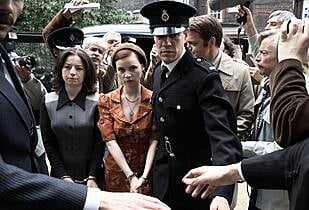- Culture
- 12 Mar 01

As in most branches of the arts and entertainment business there are two types of musicians: actual musicians and would-be musicians. Just like all those would-be writers who could have written Ulysses but went for a drink instead, there are countless Irish bands who could have been as big as U2 but just didn't want to bother with all that business shit. With a reputed #80 million in the bank I bet Bono really regrets having anything to do with all that business shit, poor sucker.
Perhaps we should devote some time to advising the would-bes on how they can best achieve their stated aims, the main one being not to achieve anything at all. The first essential is to pick a really bad name, ideally one that DJs can t pronounce, journalists can t spell and which is likely to be used by lots of other bands as well so that in the event you accidentally get anywhere at all you ll get sued and be compelled to change it.
You must find a manager fast and one with no business skills whatsoever. To make a demo that stands out from everybody else s nab some old Neil Young cassette from your grandfather, tippex out the label details and gouge your name into the tippex with a defective biro.
Fill that tape with as many songs as possible, putting the really long ones at the start. If one or two of your songs are quarter-decent, put them near the end. Most importantly, don t include any contact name or number nor any background material, unless you have a really weird sense of humour in which case a few dozen pages of illegible zany ramblings will do fine.
Extreme care must be taken over who you send it to. People who have left record companies and radio stations years ago should be top of your list, followed by those who have no connection or interest in the genre of music you specialise in. Heavy metal would-be s, for example, should make sure Gael Linn and Claddagh get copies.
Next you must phone all the people you sent it to, every day for as long as they keep taking your calls. Then, when shit happens after, say, ten or twelve years, you can always blame Dave Fanning or that bloke in the record company whose name you spelled wrong. It won t be easy, but if you really have faith it s well worth shooting for as it will give you enough hard-luck excuses for life.
Now if only that Bono bloke had had the benefit of this column he too could have avoided all that business shit. Unfortunately it s too late for him, but not for you, so don t let this chance pass you by.
The Jones s are a four-piece from Artane in Dublin who wouldn t know an original idea if it bought them a round of drinks. Their vocalist sometimes sings in American as if he s auditioning for Hootie and The Blowfish. But in the end it doesn t matter one whit for they play and perform with such zest on a batch of classily dynamic songs that you d forgive them for stealing your last Rolo.
Mrs Jones has a big fat guitar sound and a collection of contemporary influences that includes everybody from Hootie to Travis, the Stereophonics, the Dandy Warhols et al. On And On is a delicious pop rock ballad without the pomposity that often oozes from that genre, and with more great guitar noises. The speedy Easy slams in with some more in-your-face guitar, great vocals, an incendiary guitar solo and a chorus that would do justice to a modern-day Undertones. Yes, keeping up with The Jones s could be well worth the effort, since this isn t a demo at all, just a great record.
Despite his penurious circumstances, Sean Grant has produced a cassette demo that adequately illustrates his skills as a writer and singer. Grant can write songs with introspective depth and intelligent lyrics, but they often feel more like poetry set to music than actual songs.
Don t Ask Me To Break Your Fall is a heartfelt slab of loneliness and frustration that has too many long lines. It needs a decent chorus to hook the listener and lead him/her into the song s thoughtful content. Much the same could be said for the wistful Crossing Over although it has generally less convoluted lines. Perhaps Grant needs to examine a couple of favourite songs and see how and why they work then apply the lessons learned to his own material before having another shot.
You can tell that Underbelly, the indie-pop quartet from Strabane, have their fingers on the pulse when you get a letter that opens with an ego-deflating Dear Sir/Madam . But their unusual style, with a falsetto unison voice tracking Michael Ferry s lead vocal line, sets them them apart from less original contemporaries. The benefit of extensive gigging is evident in the ease with which they glide through songs like the excellent The Thin Horizon . If Not For You loses a little of the momentum along the way, but faith is quickly re-established with the chain-gang thump of the broody The Last Days .
The Underbelly trademark is a nicely-out-of-synch looseness that takes real self-confidence to bring off. Niall Kennedy s mandolin adds a nice offbeat touch, and it augurs well for their debut album later in the year.
Lesson of the fortnight: Decide whether you want to really go for it or be content with would-be-hood for the rest of your life.










